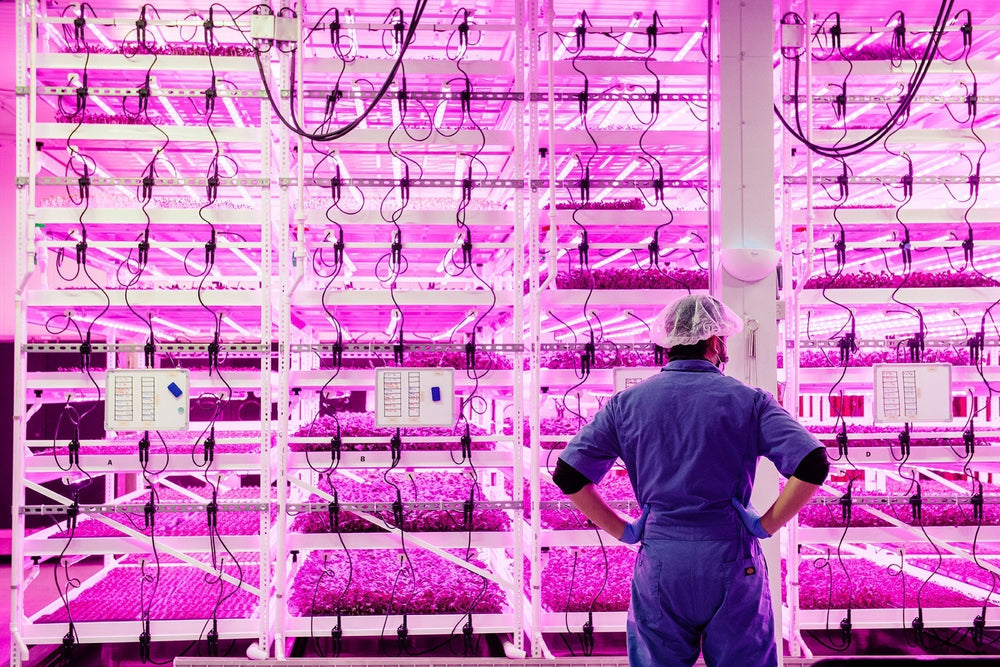
What if one day you’re standing in a room where rows of green leaves stretch up toward the ceiling? They aren’t growing in soil. Instead, they’re sitting in trays of water that look as clear as glass. Soft purple light fills the room. The air smells fresh, like you’ve just opened a box of herbs. No tractors, mud, or buzzing insects. Just quiet hums of water pumps and fans, like a futuristic garden in the heart of the city.
This is not a sci-fi movie scene we just explained. It's a real, rapidly growing movement that’s reshaping agriculture and food security worldwide. That’s hydroponic farming. In this blog, we’ll explore precisely what hydroponic farming is, how it works, why it’s changing agriculture, and what it means for your plate.
What Is Hydroponic Farming?
Let’s start simple. Traditional farming is like sending kids to school with only a packed lunch and hoping they’ll figure out the rest. Some days it rains, some days it doesn’t. Sometimes pests arrive. Sometimes the soil is good, sometimes not. It’s unpredictable.
Hydroponic farming flips the script. Instead of leaving plants to fight it out in the dirt, farmers give their roots direct access to everything they need: water, nutrients, oxygen. All neatly arranged in a system designed just for them. The plant doesn’t waste energy searching. It simply grows. And grows fast. Leafy greens become crisper. Herbs grow fragrant and lush. Even tomatoes and strawberries flourish in this setup. It’s farming made smart.
How Does Hydroponic Farming Work?
Here’s the fun part. Hydroponics is only about clever engineering. There are several types of systems at play:
-
There is one system called NFT (Nutrient Film Technique), which is a gentle stream of nutrient-rich water that flows like a river across the roots, feeding them constantly.
-
On the other hand, we have Deep Water Culture, where plants float like little boats on a tank of water while their roots dangle below, soaking up food and oxygen.
-
We also have Drip Systems, which provide each plant with a precise drip of water and nutrients, much like a machine that never makes mistakes.
The entire process happens inside a controlled environment. LED lights act as the sun. Air and water are recycled. The temperature never gets too hot or too cold. Plants don’t deal with drought, pests, or monsoon delays.
The result is that crops grow up to 50% faster while using 90% less water than traditional farming. Imagine that in a world where water is becoming scarcer every year.
Inside a Hydroponic Farm

Walking into a hydroponic farm is like stepping into another world. Instead of open fields, you see rows of trays stacked vertically, glowing under purple-blue LED lights. The plants look alive in a way that’s hard to describe: crisp leaves, no blemishes or wilting.
Some farms even feel like art installations. Viola flowers bloom with playful colors, snapdragons stand tall, and pansies add bursts of brightness. It’s not just food; it’s beauty growing in layers, right in the heart of a city.
And the best part? Because the system is clean and controlled, no pesticides are needed. The spinach or basil you pick is ready to eat on the spot. It’s like walking into a future grocery store where everything looks fresher than you imagined.
Why Hydroponics Is Changing Agriculture
Here’s where it gets real. Agriculture has always been at the mercy of nature. Floods, droughts, and unpredictable weather can wipe out entire harvests in hours. Land is becoming increasingly expensive, and cities are encroaching on farmland.
Hydroponics is a solution to this growing problem.
-
More food, less space: By growing vertically, farmers can produce 10 times more crops in the same area.
-
Location doesn’t matter: A hydroponic farm can thrive in a desert, in a high-rise basement, or even in outer space. (Yes, NASA is experimenting with it for astronauts.)
-
Consistent harvests: No more depending on whether the rains arrive. These systems create their own seasons indoors.
This is especially powerful for urban farming. Imagine neighborhoods in New York growing their own food right where people live. The lettuce on your sandwich could be picked a few hours before it reaches your plate: no long truck rides, no wilted greens, just fresh crunch.
It’s farming tailored for a planet with more people, less land, and less patience.
Challenges and the Road Ahead
Hydroponic farming has its hurdles as well. Those LED lights and climate controls? They use a lot of energy. Setting up a farm isn’t cheap either. People need infrastructure, training, and constant monitoring for this. For small farmers, that’s a significant barrier.
But here’s the twist: technology is catching up. Renewable energy is powering more farms than we can count on our hands. AI systems are now capable of monitoring plant health in real time, spotting stress before we ever notice it. Costs are dropping as systems scale.
It’s the classic new-tech curve. What feels expensive and futuristic today might feel normal and affordable tomorrow. Hydroponics is moving fast, and the road ahead looks like it’s only getting smoother.
Why It Matters for You

All this sounds futuristic, but let’s bring it back home. Why should you care?
At Planted Detroit, we see how it changes what ends up on your plate.
-
Your salad could be fresher than ever, harvested in the morning and eaten by lunch.
-
Your spinach could be cleaner, grown without pesticides or soil contaminants.
-
Your basil could be more flavorful, nurtured under perfect conditions.
And it’s not just about the taste. It’s about knowing your food was grown with less water, less land, and less damage to the planet. Every bite tells a story of sustainability and innovation.
The Future on Your Fork
Hydroponic farming is a glimpse into a future where food grows closer, cleaner, and smarter.
It’s already happening in Detroit, places like Planted Detroit are growing vibrant greens and edible flowers right inside the city. And platforms like Market Wagon, the largest online farmers market, make this kind of produce easier than ever to buy.
So, the next time you crunch into fresh lettuce or sprinkle herbs on your pasta, imagine a world where more of our food comes from these glowing, futuristic farms. Explore our salad bundles and taste the difference.
